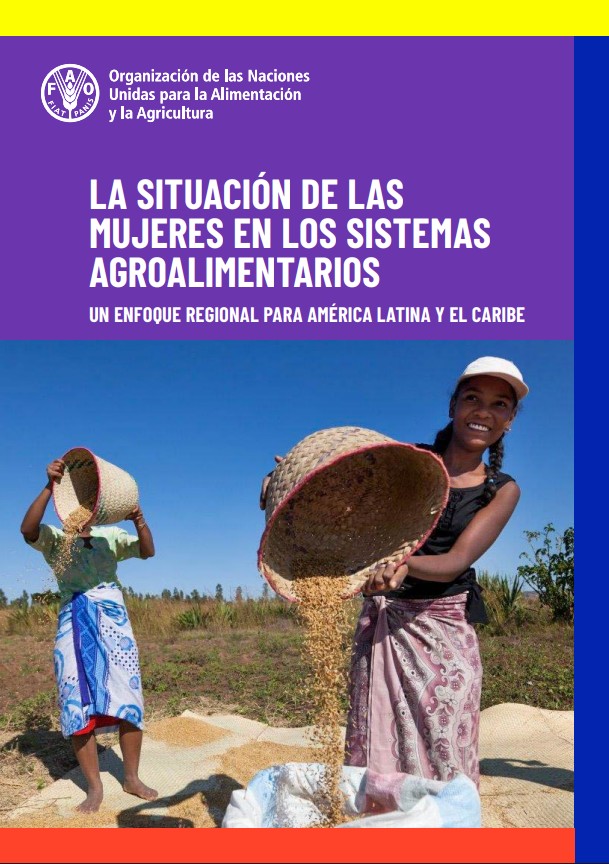Launch of the Regional Report: The status of women in agrifood systems
A regional approach for Latin America and the Caribbean
Virtual Event, 20/05/2025

Live broadcast
Context
This year marks the 30th anniversary of the Beijing Declaration and Platform for Action, the most ambitious and visionary global framework for advancing women's rights, adopted at the Fourth World Conference on Women in 1995. In this context, the 69th session of the Commission on the Status of Women at the United Nations will focus on accelerating the fulfillment of commitments made by Member States in Beijing, further reinforcing the urgency and relevance of addressing the inequalities faced by rural women. Additionally, we commemorate the 50th anniversary of the First World Conference on Women, held in Mexico in 1975.
Despite these historic milestones, challenges remain. Worldwide, women continue to face significant gaps in the full exercise of their rights. According to the Economic Commission for Latin America and the Caribbean (ECLAC), wage inequality persists at high levels. In the Latin America and Caribbean region, in 2023, women earned on average 17% less than men for the same work. Furthermore, women spend between twice and three times more time on unpaid domestic and care work compared to men (ECLAC, 2023), limiting their participation in economic and political activities. In several countries, this time burden is even greater in rural areas.
The inequalities in labor market participation between men and women are partly influenced by the heavy load of unpaid domestic and care work that women undertake, such as cleaning, cooking, caring for household members, and collecting water. This burden is also associated with lower agricultural productivity among women compared to men. Likewise, women employed as wage workers are at a disadvantage regarding salaries received within agrifood systems, both in agricultural and non-agricultural sectors. Most of this wage gap is explained by structural effects linked to discrimination (FAO, 2024).
Specifically in our region, unequal access to productive resources such as land, financing, and technology remains a barrier to the empowerment of rural women, who represent a significant proportion of the labor force in agrifood systems.
To address these challenges, it is essential to have tools that provide a comprehensive, data-driven view of the situation of rural women in all their diversity across Latin America and the Caribbean. In this regard, FAO presents the report The Status of Women in Agrifood Systems: A Regional Approach for Latin America and the Caribbean.
This document not only updates the information presented in previous reports but also provides a thorough analysis of the progress and challenges faced by women in agrifood systems. Additionally, it highlights how empowering women yields multiple benefits in ensuring food and nutrition security, boosting economies, promoting sustainable development, and enhancing the well-being of entire societies.
Such reports are fundamental for designing more effective public policies and promoting transformative actions that recognize and strengthen the crucial role of rural women in developing more sustainable, inclusive, and resilient agrifood systems.
In this context, global commitments such as the International Year of the Woman Farmer in 2026 take on special relevance, highlighting the urgent need for actions that recognize and support their key role in food security, poverty eradication, climate change adaptation, and biodiversity conservation.
Reaffirming its commitment to gender equality in rural areas, FAO is advancing the Rural Women Empowerment and Environmental Sustainability Acceleration Programme, aimed at creating an enabling sociopolitical environment that strengthens the economic empowerment of rural women producers by applying gender-transformative practices in biodiversity conservation and environmental restoration across the region.
This regional initiative is currently being implemented through the piloting of Gender-Transformative Farmer Field Schools in Honduras and the Dominican Republic. The objective is to recognize and enhance the work of rural women producers to contribute to and benefit from economic growth, biodiversity conservation, and ecosystem restoration. In doing so, efforts are being made to promote sustainable, resilient, and inclusive food and agricultural value chains, with special attention to the participation of Indigenous, Afro-descendant, and young rural women.
Event Objectives
Reflect, within the framework of the launch of the regional report The Status of Women in Agrifood Systems: A Regional Approach for Latin America and the Caribbean, on the progress and challenges in the implementation of the Beijing Platform for Action in Latin America and the Caribbean from a rural perspective, highlighting the transformative role of women and their organizations in building efficient, resilient, inclusive, and sustainable agrifood systems, as well as in promoting public policies that guarantee women's rights within the framework of the 2030 Agenda.
Contact
Communication Specialist of the Regional Program of the Mano a Mano Initiative for prosperous and inclusive rural societies
Coordinator of social inclusion communication strategies

